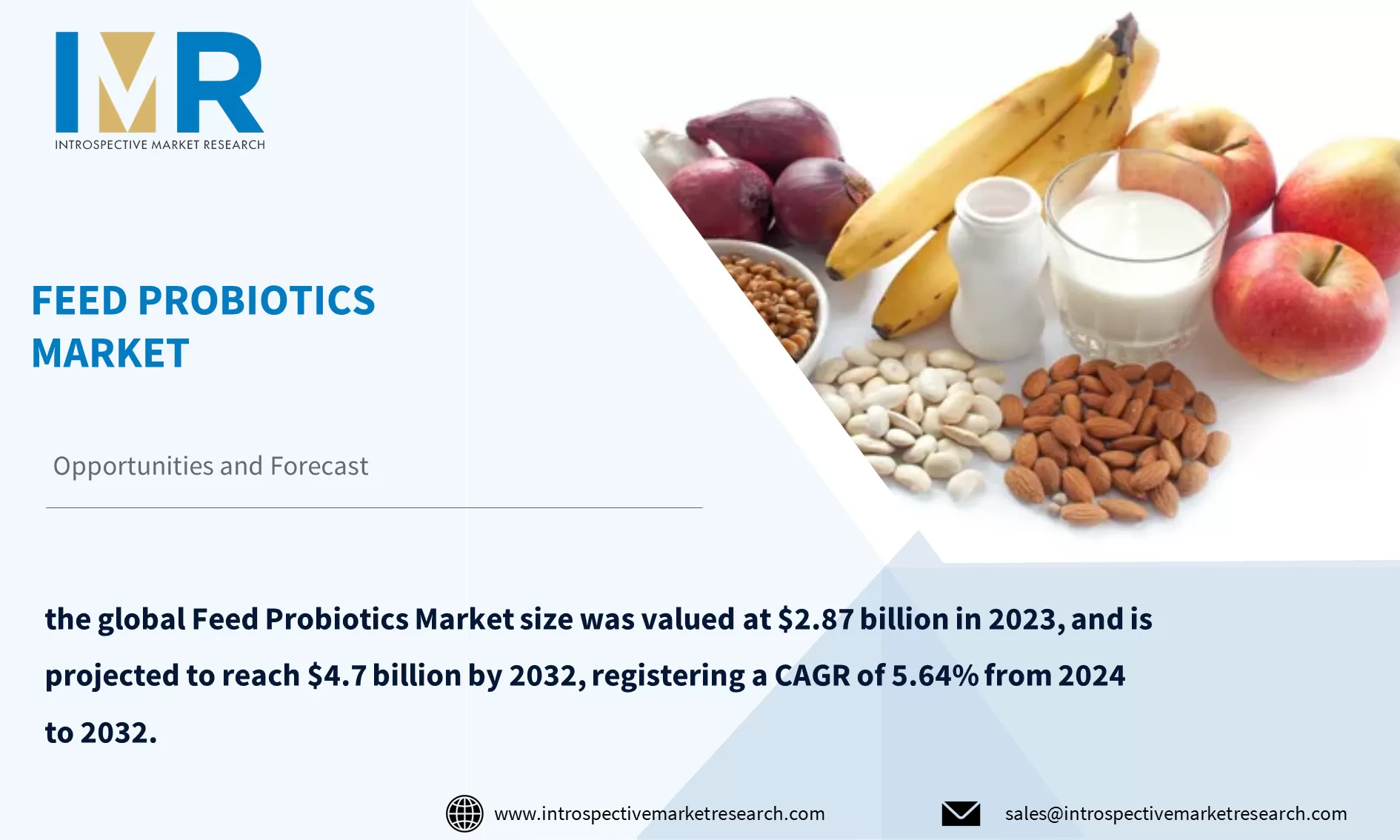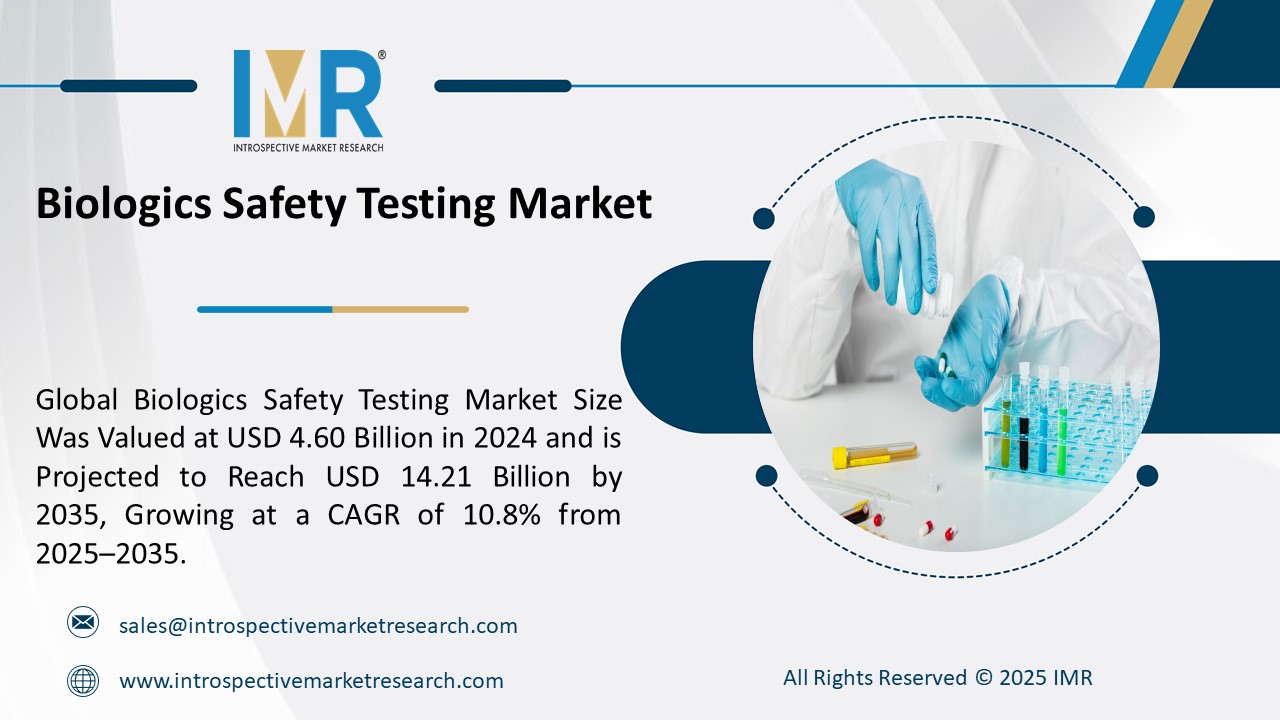
Feed Probiotics Market
According to a new report published by Introspective Market Research, titled, ?Feed Probiotics Market by Application and Packaging Type: Global Opportunity Analysis and Industry Forecast, 2024?2032,?
the global Feed Probiotics Market size was valued at $2.87 billion in 2023, and is projected to reach $4.7 billion by 2032, registering a CAGR of 5.64% from 2024 to 2032.
Nutritional probiotics are inexpensive microorganisms that are intentionally added to animal feed to promote digestion and well-being. These microorganisms, which can include bacteria and yeast, have an important function. Promotes optimal absorption of nutrients, strengthens the immune system, and maintains a balanced microbial environment in the digestive tract. Their presence actively promotes feed efficiency and overall livestock performance. Phosphates play an important role in animal nutrition and nutrition and contribute significantly to the health and development of livestock in various applications. When compounds such as monocalcium phosphate are added to feed compounds, they are important suppliers of phosphorus and calcium needed by animals. They actively promote bone formation, metabolic processes, and growth in various animal species, ensuring a balanced diet that fulfills nutritional needs and increases well-being. They improve the bioavailability of important nutrients and promote efficient absorption by the animal's digestive system.
According to the Feed Probiotics Market is segmented into Type, Form, Animal, and region. By Type, the market is categorized into Enterococcus, Bifidobacteria, Lactobacilli, Streptococcus, and Pediococcus. By Form, the market is categorized into Dry and Liquid. By Animal, the market is categorized into Ruminants, Poultry, Swine, Aquatic, Pets, and Equines. By region, it is analyzed across North America (U.S.; Canada; Mexico), Eastern Europe (Bulgaria; The Czech Republic; Hungary; Poland; Romania; Rest of Eastern Europe), Western Europe (Germany; UK; France; Netherlands; Italy; Russia; Spain; Rest of Western Europe), Asia-Pacific (China; India; Japan; Southeast Asia, etc.), South America (Brazil; Argentina, etc.), Middle East & Africa (Saudi Arabia; South Africa, etc.).
Growing demand for animal protein stands out as a major force driving the expansion of the food probiotics market. As the world's population grows and food preferences change, there is a clear and growing need for animal protein sources. This increase in demand, due to factors such as rising incomes and urbanization, is a major factor driving the adoption of nutritional probiotics. Producers and farmers are actively responding to the increased need for animal proteins by introducing innovative solutions, such as probiotics, aimed at improving livestock health and productivity. Livestock promotes digestive health and improves nutrient absorption, which improves feed efficiency and overall performance. The digestive effects of probiotics improve animal welfare, ultimately resulting in high-quality animal products for human consumption. With increasing consumer awareness of the relationship between animal nutrition and meat and dairy quality, the demand for nutritional probiotics is expected to continue to grow, influencing market dynamics in response to the changing landscape of the animal protein industry.
Advances in research and technology emphasize the importance of identifying and breeding these new species, which is necessary to improve the effectiveness of feed additives. These innovative strains actively promote gastrointestinal health and cattle welfare, driving the market forward. Manufacturers and researchers are realizing the potential of these new probiotic strains and are actively investing in their development to meet the changing demands of the animal nutrition industry. The integration of these new probiotic strains is critical to meeting the dynamic challenges facing the livestock industry. Their central role in optimizing nutrient utilization, supporting immune function, and mitigating the effects of stressors on animals contributes significantly to livestock performance and health. Continued research and incorporation of these strains into feed formulations is essential, providing farmers with powerful tools to address specific livestock needs and develop the feed probiotics market.
Global Feed Probiotics Market, Segmentation
The Feed Probiotics Market is segmented based on Type, Form, Animal, and region.
Type:
The type segment is further classified into Enterococcus, Bifidobacteria, Lactobacilli, Streptococcus, and Pediococcus. Among these, the Lactobacilli sub-segment accounted for the highest market share in 2023. The prominence of the lactobacilli segment in driving the growth of the feed probiotics market is attributed to its central role in promoting gastrointestinal health and livestock. Lactobacilli are important microorganisms that actively promote the balance of intestinal flora, optimize nutrient absorption, and support the immune system. Their inherent ability to break down complex compounds in the digestive tract is crucial to improving feed efficiency and overall animal health. The versatility and adaptability of lactobacilli are widely known, which allows them to develop well in different environmental conditions in the digestive system of animals. This adaptability underlines their widespread use in feed formulations, making them an important part of farmers and producers looking for reliable solutions to improve the efficiency and productivity of their livestock.
Animal:
The Animal segment is further classified into Ruminants, Poultry, Swine, Aquatic, Pets, Equines, and Aquatic Animals. Among these, the Poultry sub-segment is anticipated to show the fastest growth by 2032. Driving the growth of the food probiotics market is the poultry segment, which has the largest share due to its reliance on these microorganisms. Poultry farming faces special challenges and the use of probiotics, especially lactobacilli, is essential to maintain bird health and performance. Probiotics significantly promote the digestive health of birds, promote nutrient absorption, and strengthen the immune system of birds. Thus, they play a crucial role in optimizing feed efficiency and overall productivity in poultry farming. The digestive effect, the ability of probiotics, especially lactobacilli, to adapt to the bird's environment is extremely important. These microorganisms are well suited to the conditions of the digestive system of poultry and ensure their effectiveness in promoting intestinal balance and relieving stress factors.
Region:
The Feed Probiotics Market in Asia-Pacific is projected to show the fastest growth by 2032. The important role of Asia Pacific in promoting the growth of the nutritional probiotics market is due to its significant contribution in shaping the growing agriculture and livestock sector of the region. Countries in the Asia-Pacific region are experiencing increasing demand for high-quality animal products due to population growth and rising incomes. Producers recognize that nutritional probiotics, which play an important role in promoting animal health and performance, are critical to meeting this growing demand. Proactive deployment of these microbial solutions in the region underscores their importance to total livestock. The core nature of nutritional probiotics aligns with the region's commitment to sustainable and efficient agricultural practices. As the agricultural landscape changes, the integration of probiotics to optimize feed efficiency, support animal immune systems, and improve overall productivity will become critical.
Some of The Leading/Active Market Players Are-
- Iff (Danisco Animal Nutrition) (US)
- Land O? Lakes, Inc. (US)
- International Flavors & Fragrances Inc. (US)
- Arm & Hammer Animal And Food Production (US)
- Alltech (US)
- Kemin Industries, Inc. (US)
- Cargill (US)
- Adm (Archer-Daniels-Midland Company) (US)
- Danone (France)
- Adisseo (A Bluestar Company) (France)and Other Active Players
Key Industry Developments
- In December 2023, the Asia Pacific probiotics in animal feed market witnessed significant growth. Probiotics promote animal health and productivity by maintaining a balanced gut microbiota for optimal nutrient digestion and absorption.
- In October 2023, Evonik and Shandong Vland Biotech successfully launched a joint venture in China dedicated to enhancing the gut health of farmed animals through a specialized focus on probiotics.
Key Findings of the Study
- The global Feed Probiotics Market was valued at $2.87 million in 2023 and is projected to reach $4.7 million by 2032, registering a CAGR of 5.64% from 2024 to 2032.
- Market growth is driven by the increasing demand for animal protein, advancements in probiotic strains, and significant contributions from the Asia-Pacific region.
- The Lactobacilli type segment accounted for the highest market share in 2023 due to its role in promoting gastrointestinal health and livestock productivity.
- The poultry segment is anticipated to show the fastest growth by 2032, driven by the need for probiotics to maintain bird health and performance.





